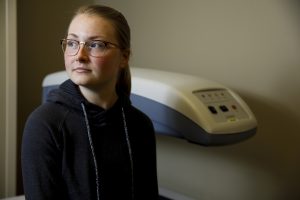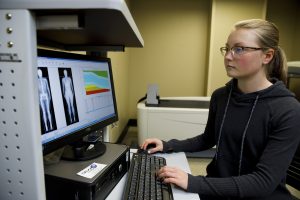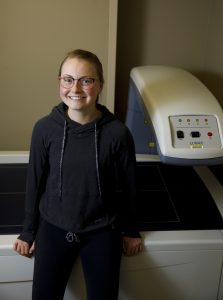Undergrad’s autoimmune disorder shifts major, leads to first published research paper
By David Miller

Jessica Bentley had managed her celiac disease for four years before enrolling at UA in 2017. Her mother and sister both manage the disease, so Bentley had a blueprint for transitioning to a gluten-free diet and supplements to improve her energy and health.
But, as parents typically worry about their children when they leave for college, Bentley’s parents had the added uncertainty of how she’d manage her diet.
“My mom was really concerned: ‘where are you going to eat? What if you get sick?’” Bentley said. “We choose my meal plan carefully, so last year, I had to text ahead about what foods I would eat.”
Bentley was diagnosed with the disease after she broke her pelvis, a non weight-bearing bone and indicator that her bone density was low. As she’s continued her hobby as a distance runner, she’s had to incorporate weight lifting and dietary changes to strengthen her bones.
Managing celiac disease has since become a mission of discovery for Bentley, who changed her major from chemical engineering to kinesiology/pre-med to study the disease and its effects on bone health. That path led her to a research opportunity with a UA faculty member and a rare feat for an undergraduate student: getting published in an academic journal.
Bentley and her faculty mentor, Dr. Michael Fedewa, assistant professor in the department of kinesiology, collaborated on “Celiac disease and bone health in children and adolescents: A systematic review and meta-analysis,” published in the February 2019 issue of the Journal of Clinical Densitometry.
The pair reviewed multiple databases and existing literature related to celiac disease. Both Bentley and Fedewa cross-checked, scored and coded their results. They collaborated with Fedewa’s colleagues that are experts on childhood bone health and nutrition.
“The key finding was something we expected: children with celiac disease have sub-optimal bone health and stature,” Bentley said. “These kids are often a lot shorter and have malnutrition. The study helped us confirm this.”
An emerging scholar
Fedewa says Bentley is the only undergraduate student he’s worked with who has been published, especially as a prominent author on a paper.

“More specifically, this is her project,” Fedewa said. “It’s a rare feat. I didn’t get my first article published until my PhD program.”
Bentley, a native of Cleveland, Ohio, participated in the Emerging Scholars Program at UA, which helps undergraduates get research experience by connecting with faculty mentors.
Through the program she met Fedewa, who studies body composition. After the program’s initial seminar, Fedewa urged Bentley to narrow her research focus to something that aligns with her career goal of working in allied health.
Celiac disease was Bentley’s obvious motivator.
“There should be no one in the world more interesting to you than yourself,” Fedewa told Bentley. “So I said, ‘why don’t you research yourself?’”
From there, they hashed out their research topic. Bentley presented an abstract that included preliminary data work and different variables on bone density at the 2018 UA Undergraduate Research and Creative Activity Conference, where she was honored for “most outstanding proposed research.”
A year later, after being published, she celebrated by calling her parents and “doing homework.”
“I knew we’d submitted it to a few journals, but you don’t really get a timeline of when you find out,” Bentley said. “And two weeks ago, I remember reading an email from Dr. Fedewa and thinking, ‘wait a minute, I just got published.’ How cool is that?”

A future in medicine
Facing another 13 to 15 years of school to obtain a doctorate of medicine and of philosophy is daunting, and programs often reserve a small fraction of their cohorts to those students, Bentley said.
But Bentley says she feels empowered by her first major research opportunity and is eager for her next study, which will include studying bone density in college students with and without celiac disease and how much changes in diet improve bone health.
She’s particularly excited to use the department’s DEXA body composition scanner.
“I remember needing a scan and insurance not wanting to pay for it,” she said. “My orthopedic surgeon had to call and tell them I need it. So it’s cool to get to use it.”
Bentley hopes to secure a summer research internship position at the Cleveland Clinic in Ohio.
“Even if it’s not related to celiac disease or autoimmune disorders, it’s a hub for research and a great opportunity,” Bentley said.
